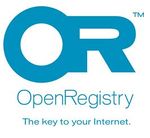OpenRegistry
Revision as of 18:09, 27 July 2011 by Marie Cabural (talk | contribs)
| Industry: | Internet/Information Technology |
| Headquarters: | Belgium and Luxembourg |
| Country: | Belgium |
| Website: | OpenRegistry.com |
| Facebook: | OpenRegistry |
| Twitter: | |
| Key People | |
| Jean-Christophe Vignes, CEO Jan Jansen, Operations Geert Debyser, Development Hans Seeuws, Communications | |
OpenRegistry is a newly established company which provides back-end technology solutions for registrars such as new generic top level domain names (gTLD) registration system and DNSSEC solutions. The company is based in Luxembourg and Belgium.
The company was founded by Jan Jansen, Geert Debyser and Hans Seeuws who became part of the successful creation and operation of the .be and .eu registries. OPen Registry is also involved in the development of policies for various country code top level domains (ccTLD) such as .fr, .tm, .ac, .sh, and .io.
The company claims that its staffs has 20 years of experience in providing management solutions for registrars and TLD managers.[1]
Solutions
The company offers the following services:
- Consultancy services for entities who wish to apply for new gTLD to the Internet Corporation for Assigned Names and Numbers starting from feasibility studies, identifying operational and business criteria, marketing and technical requirements, legal assistance, implementation and launch and continuous assistance.[2]
- OpenRegistry Software- The company offers flexibility,security, stability, trademark and data protection for its clients. The OpenRegistry Software offers the following features:[3]
- Capable of supporting non-latin domains, IPv6, and DNSSEC
- It has all the technical functions required by ICANN
- 100% free and open source database system (PostGres)
- Hosted, licenced or managed models
- It complies with RFCs for registration, resolution, and whois information
- It offers more 270 configuration options, to meet any and all policy or technical needs
- Built-in rights protection mechanisms (CHIP, URS)
- Multi-currency
- Real-time information on the demographics of each web site’s visitors

